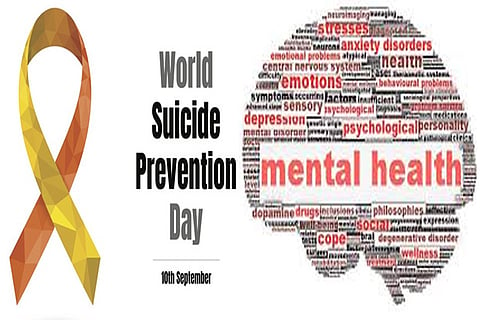

Chennai
The situation can vary greatly by country. September 10 marks World Suicide Prevention Day (WSPD), an annual global event organised by the International Association for Suicide Prevention (IASP) and co-sponsored by the World Health Organization. It’s a day of remembrance to mourn those who have passed and also serves as a global call to check in with one another.
And this year possible effects of the coronavirus pandemic on suicide rates are a topic of debate among experts. This year’s commemorative and educational activities are taking place under the motto “Working Together to Prevent Suicide” — and adapting the programme to the anti-coronavirus measures has been a challenge.
“We can’t physically touch each other at the moment, but it is all the more important to interpret the motto symbolically — that we are actually still there for each other and take care of others,” Schneider said. Experts agree the effects of the coronavirus pandemic can heighten proven risk factors for self-harm, including isolation, anxiety, economic loss, and increased alcohol and drug consumption.
At the same time, researchers have cautioned against drawing conclusions about the pandemic’s impact on suicide rates, saying the data is just not there yet. “We still do not know a lot about what the impact of the pandemic is on suicides. But of course, there’s a strong impact on suicide prevention, particularly when it comes to service delivery,” Thomas Niederkrotenthaler, a suicide researcher and treasurer at the IASP said. Niederkrotenthaler and dozens of fellow researchers are currently helping to coordinate and compile studies around the globe on suicide prevention during the COVID-19 pandemic. The hope is to come up with policies that will help people weather this pandemic and the ones to come.
“I think it’s important to note that we do not necessarily have to reinvent the wheel because of the pandemic, but we really need to see how we can translate what we know from before the pandemic to the situation we are in,” he said.
Seeking assistance online
Although coronavirus restrictions closed doors, they also opened digital windows. Crisis care hotlines and local groups expanded their reach to offer online services, group sessions were arranged via video chats and therapists could still meet with their patients — albeit behind computer screens.
“This is a very unique crisis, also a very unique pandemic, because, for the first time, we actually have the opportunity to use online services,” according to Niederkrotenthaler, who also heads the suicide research unit at the Medical University of Vienna.
Recovery is possible
There is no one cause for suicide. For those struggling with depression and suicidal thoughts, the message from experts is clear: you are not alone. “It’s important to offer contact and a relationship to the person who is affected and to maintain this contact,” noted Barbara Schneider, who is also the head physician in the department for dependency-related illnesses at the LVR clinic in Cologne. “Also if you notice that it’s not sufficient, or if you consider it to be insufficient, to arrange for further help.” Even in times of physical distancing, it’s important to check in with people who may be struggling and to ask them directly about it.
“What people, in general, should absolutely know is that help is possible,” she added.
— This article has been provided by Deutsche Welle
Visit news.dtnext.in to explore our interactive epaper!
Download the DT Next app for more exciting features!
Click here for iOS
Click here for Android